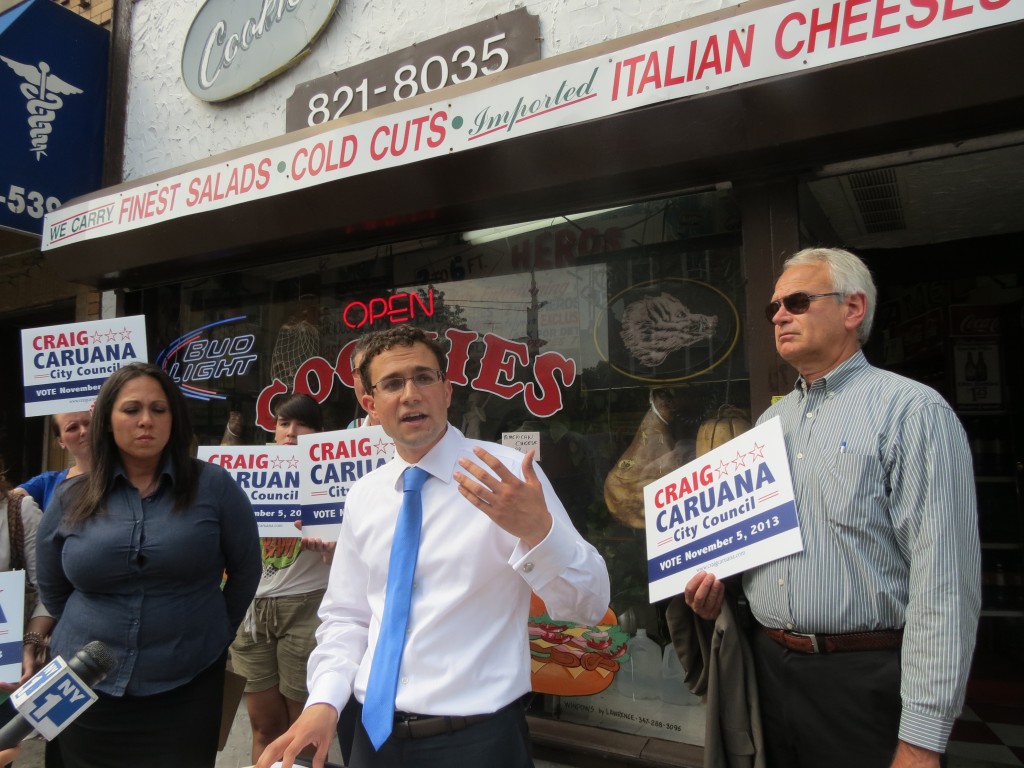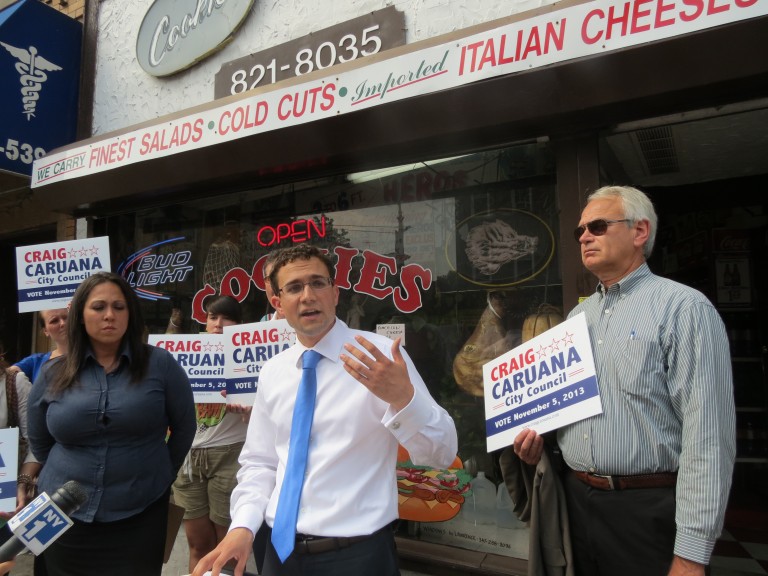
City Council candidate Craig Caruana, center, is joined by another Council candidate, Danielle De Stefano, left, and Juniper Park Civic Association President Bob Holden to denounce proposed legislation that would charge customers a dime for each plastic or paper bag provided to them in a store. Anna Gustafson/The Forum Newsgroup
A recently introduced City Council bill that would result in shoppers being charged 10 cents for each plastic or paper bag provided to them in stores drew harsh criticism from political candidates and area civic leaders this week.
“It’s essentially a tax, no matter what semantic game they play,” said Craig Caruana, a Republican running for Councilwoman Elizabeth Crowley’s (D-Middle Village) seat representing Council District 30. “It’s a compulsory charge, forced by the government, to make people conform to what the elites thing is important. This might be fine for the wealthy, trendy folks in Manhattan and Brooklyn, who have the luxury of being concerned what’s fashionable. For the hard-working middle-class families in our district, it’s yet another expense that stretches our budgets even further.”
Caruana was joined by Danielle De Stefano, who is running on the Independence line for Councilman Peter Vallone, Jr.’s seat in western Queens, Juniper Park Civic Association President Bob Holden, and other residents for a press conference on Monday on Myrtle Avenue in Glendale to denounce the legislation unveiled by Council members Brad Lander (D-Brooklyn) and Margaret Chin (D-Manhattan) last week.
If the Council passes the bill, customers at grocery and retail shops would be charged 10 cents for each plastic or paper bag given to them by the store. Lander and Chin said the legislation, which has garnered the support of such Queens Council members as Crowley and Councilman Daniel Dromm (D-Jackson Heights), would serve as an incentive for individuals to bring their own reusable bags. According to a release from Lander, the city pays an estimated $10 million to dispose of 100,000 tons of plastic bags in landfills each year.
The 10 cents paid for each plastic or paper bag not brought by the customer would be retained by the store. Restaurants would not be included in the legislation because of what the sponsors called “limited alternatives” for delivery and take-out food orders. Produce, meat and bulk food bags used within stores would be exempt for the charge in an effort to protect food from contamination. Pharmacy counter bags for medicine would also not be a part of legislation.
A spokesman for Crowley said she is backing the bill because “there are about 5.2 billion plastic bags that are used in the city every year – and most of them are not recycled.
“They end up in landfills; they clog up recycling machinery; they end up in catch basins, which can lead to flooding,” said Crowley spokesman Eric Yun. “It costs $10 million a year for the city to property dispose of these bags, and she thinks this is a good environmental message to reduce non-reusable plastic bags.”
But Caruana argued that the bill would be a financial blow to Queens shoppers.
“A middle-class mom doing grocery shopping for her family might have to pay around $2 more every time she shops,” Caruana said. “That probably doesn’t sound like much to the elite crowd, but working people need every dollar they earn.”
Holden, too, slammed the proposal.
“How much will it ever go down?” the JPCA president said of the 10-cent fine. “Will it ever go away? The answer is no… This is an attack on the middle class.”
Fuad Alkadi, the owner of Sal Gourmet Deli in Glendale, said small mom-and-pop stores would be particularly hard hit by the fine, though he said a decrease in plastic bags littering the streets would be positive.
“It’s going to be a problem,” he said. “A lot of people won’t want to pay it.”
Supporters of the bill have stressed that other cities around the country, including Washington D.C., Seattle, Los Angeles, and San Francisco, have implemented similar laws and have experienced a significant drop in the use of plastic bags.
“It can be easy to forget the impact we each have on the environment – an impact that really adds up when you have a city of eight million people,” Lander said in a prepared statement. “The truth is, there are a lot of times that we don’t really need a plastic bag. This common sense legislation will help New York cut plastic bag waste, both saving money and reducing litter without affecting small businesses.”
Citing concerns over the cleanliness of reusable bags, Caruana pointed to a 2010 University of Arizona study that found such bags can be a breeding ground for food-borne bacteria and pose a risk to public health. The study, which the University of Arizona conducted along with Loma Linda University in California, randomly tested reusable grocery bags carried by shoppers in Tucson, Los Angeles and San Francisco. It reported 97 percent of those interviewed never washed or bleached their reusable bags.
“Reusable bags may be as clean as watching a Miley Cyrus performance,” Caruana said in reference to the 20-year-old pop star’s controversial performance at Sunday’s MTV Video Music Awards.
Researchers involved in the 2010 study said that if municipalities do encourage the use of reusable bags, they should require instructions on the carriers indicating the bags need to be cleaned or bleached – as well as invest in a public education campaign to inform the public about the issue.
“Our findings suggest a serious threat to public health, especially from coliform bacteria including E. coli, which were detected in half of the bags sampled,” University of Arizona Professor Charles Gerba said in a prepared statement when the 2010 study was released. “Furthermore, consumers are alarmingly unaware of these risks and the critical need to sanitize their bags on a weekly basis.”
By Anna Gustafson

